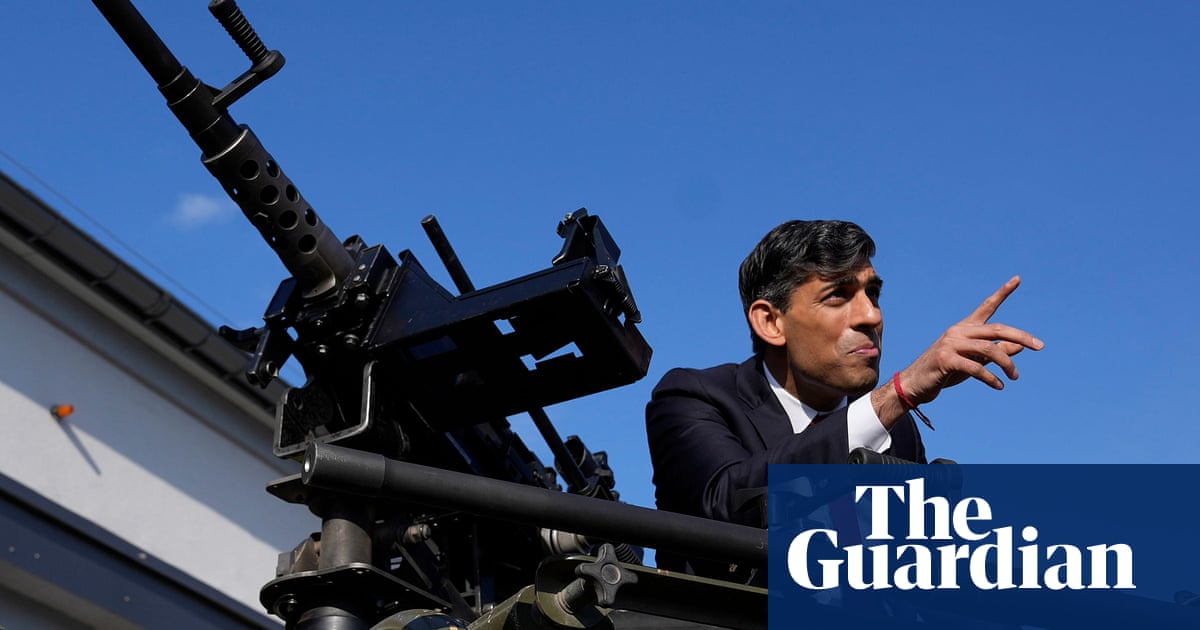
Keir Starmer will call on Nato countries to increase defence spending in response to rising global threats as he launches a major review setting out UK plans to spend tens of billions of pounds extra on the military.
The prime minister will use Nato’s 75th-anniversary summit in Washington, his first international trip since winning power, to underline Britain’s “cast-iron” commitment to the defence alliance.
He will say that further increases in spending from allies will help Nato tackle the nature of today’s threats including Vladimir Putin’s invasion of Ukraine, continued instability in the Middle East and the rise of authoritarian states.
A strategic defence review will be launched next week but is likely to take up to a year to complete, meaning growing pressure on Starmer to confirm a timetable for the UK to boost defence spending to its target of 2.5% of GDP.
The Labour peer and former first sea lord Alan West said on Tuesday: “I think we ought to say when we are going to get to 2.5%. ‘When the situation allows’ is not really good enough – Putin will not wait for our situation to be good enough before he attacks.”
The prime minister, who is accompanied on the US trip by his wife, Victoria, is to meet Joe Biden at the White House on Wednesday for their first bilateral talks, where he will seek to underline the strength and stability of the transatlantic relationship despite the change in government.
His first meeting with the US president would normally be a highlight but, with questions raging about Biden’s health and age and the American election just four months away, some careful choreography may be needed. The Bidens will then host the Starmers and other world leaders and their partners at a glitzy White House dinner.
Starmer will use the Nato summit to emphasise the UK’s “unshakeable” commitment to Ukraine at a time when Moscow has escalated its attacks, hitting a children’s hospital in Kyiv this week, and with the US election in November bringing uncertainty.
The possible return of Donald Trump, whose continued backing for Nato and Ukraine remains unclear, could cast a shadow over the summit. Downing Street said it was not aware of any planned meetings between the UK contingent and Trump or other Republicans during the visit.
Starmer is expected to hold talks with Volodymyr Zelenskiy, the Ukrainian president, on the sidelines of the summit after the two met at the D-day commemorations in France during the general election campaign.
Starmer will be accompanied by David Lammy, the foreign secretary, and John Healey, the defence secretary. He will aim to use the summit to build relationships with European leaders as he tries to seal an EU-UK security pact, and he will also be joined by Nick Thomas-Symonds, the minister for European relations.
The UK currently spends 2.32% of GDP on defence, the equivalent of £64.6bn a year, which would have to steadily increase to £87.1bn a year to reach the 2.5% target.
A record 23 Nato countries are expected to hit the alliance minimum target of 2% this year, up from 11 in 2023, meaning that European Nato allies as a whole will collectively spend 2% of their combined GDP – worth £300bn – on defence for the first time.
Before the trip, the prime minister’s official spokesperson said: “Now more than ever he thinks it’s important that we come together with our like-minded partners across the world in a show of strength and collaboration, because everything he will try to achieve in government from now on depends on the security of our nation.
“We obviously want to see other countries continue to take steps to increase defence spending as well in order to ensure that we’re sending a strong signal to Putin that we will do whatever it takes to support Ukraine in their defence. The first duty of any government is to keep the nation safe and protect our citizens, and the defence of the UK starts in Ukraine.”
Healey has already done detailed preparatory work on the strategic defence review, which will determine the UK’s future defence posture and deepen defence partnerships including within Nato and Aukus.
It will consider the shape of the armed forces and their readiness to fight, capabilities needed to tackle growing threats, reforms to secure faster procurement and better value for money, as well as the roadmap to hitting the 2.5% target.
In April, Rishi Sunak said Britain would spend 2.5% of national output on defence by the end of the decade. Sunak also committed to giving at least £3bn a year to Ukraine “for as long as required”, a key request from Zelenskiy to provide more certainty in the face of Russian aggression.
Labour has long promised to hit the 2.5% figure but, coming under pressure during the election campaign to commit to a date, Starmer would only say “as soon as resources allow”.
Starmer has said his government would commit to a multi-year funding settlement for Ukraine, and urged Nato allies to do the same.
In a statement before the summit, Starmer said: “There is no more important duty for me as prime minister than keeping the people of our country safe. At a time when we face multiple threats at home and abroad, we must make sure we are ready to defend ourselves. That’s why I have immediately ordered a root-and-branch review that will secure Britain’s defences for the future.
“Working with our most important partners around the world, our strategic defence review will make sure the UK is sending a clear message to those who seek to undermine peace and democracy – you will not succeed.”
Lammy said: “Ukraine’s security is our security, so our priority for Washington must be to show that Nato support for Ukraine remains iron-clad, and our support will be sustained. Putin thinks he can outwait the west, but he is mistaken.”











